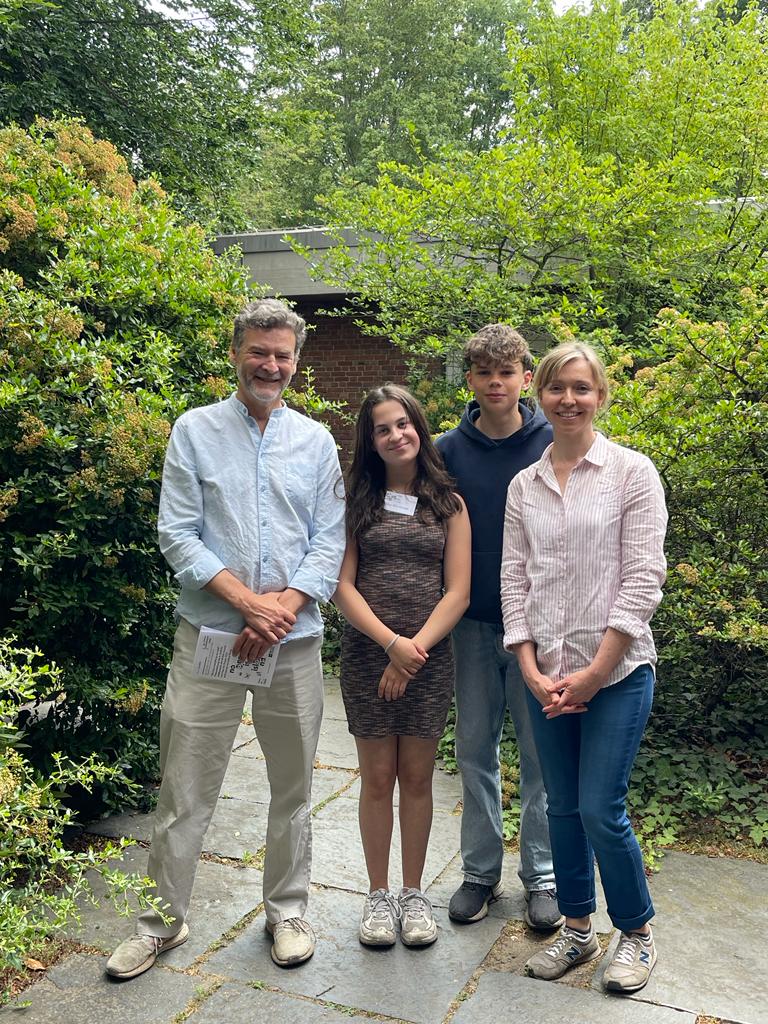Congratulations to British Council Poetry Competition winner Elisa
Congratulations to Elisa Grosse, who won first prize in the English entry section of the British Council Poetry Competition 2023, centred around the theme of ‘future’. Students from all over Germany participated in this year’s competition which was judged by former Young Poet Laureate for London, Selina Nwulu. Students were asked to respond to Nwulu’s poem „We have everything we need.“
Elisa and the other winning poets performed their poems at the Haus der Poesie, where they later took part in a poetry workshop.
The winning poems and their translations have been published on the British Council and Haus für Poesie websites.
Read Elisa’s poem below:
What have we become?
Robots slipping into our characters.
Smart Watches determining the time, that is never enough.
What have we become?
Kids knowing the console better than coloured bricks.
Holding phones more than their stuffed animals.
Technology eating their time with dolls sitting untouched in the cupboard.
What have we become?
Knowing how to type words into a phone, but not how to talk face to face.
Knowing every Hollywood movie, but not one book.
What have we become?
Wanting the perfect life, perfect body,
perfect clothes, perfect image.
But it’s never enough.
What have we become?
Knowing how to fake a smile, but not how to cry.
With everything, everyone, in their own blurred, romanticised bubble.
Ignoring ice melting,
industry eating away nature,
species dying,
innocent kids starving,
With the thick layer of fuel and dirt dulling our minds,
and numbing our awareness.
What have we become?
I wonder if our kids will know the sound of a robin chirping melodically,
know the feeling of warm summer grass tickling their skin,
Know the sound of waves splashing against the shore.
I wonder what we will have become by then.
Will technology be to advanced, for us to remain in control?
Will technology have the upper hand?
About the Berlin Cosmopolitan School, Preschool and Kindergarten
The Berlin Cosmopolitan School is changing the traditional way schools and kindergartens work with different approaches to learning in the areas of nature and environmental protection, sports, new work, culture, dance, music and art and much more. The aim of the independent school, preschool and kindergarten is to bring all students along according to their abilities.
“When school motivates, everyone learns more” is the conviction of the Berlin Cosmopolitan School. Regular outdoor learning, sports activities and competitions, digital projects such as robotics, internships from grade 6, music-making from kindergarten age, dance clubs, bilingual education and much more help the children to discover and develop their own preferences and abilities.
Important concerns of the Berlin Cosmopolitan School, Kindergarten and Preschool are social justice, equal opportunities in education and a balanced community. The school regularly awards scholarships to students and accepts refugees. Through its established network and internationally trained staff, the educational institution has the opportunity to explore new educational paths for every age group.
The Berlin Cosmopolitan School was founded in 2003 as a non-profit organisation by Yvonne Wende. In 2004, the first bilingual (English-German) kindergarten and preschool opened for Berlin-Mitte with 18 children. Shortly after, the primary school started and most recently, in 2009, the accredited bilingual Gymnasium of Berlin Cosmopolitan School 01P22. Since then, the number of students has steadily increased. Approximately 1,000 students from all over the world are now being taught on the Rückerstraße and Invalidenstraße campuses. The kindergarten has grown to a number of more than 300 children between the ages of 1 and 6.
In 2013, Berlin Cosmopolitan School was accredited as an International Baccalaureate (IB) World School, first for primary school and also for the Gymnasium. The IB Learner Profile is about developing children and young people into lifelong learners. The school and kindergarten use primary experiences to design lessons.
